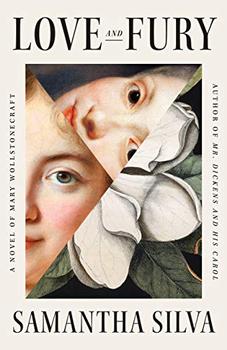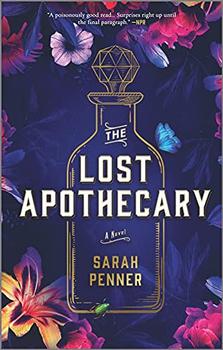Summary | Excerpt | Reading Guide | Reviews | Beyond the book | Read-Alikes | Genres & Themes | Author Bio

A Novel
by Ariel Lawhon"I cannot say why it is so important that I make this daily record. Perhaps because I have been doing so for years on end? Or maybe — if I am being honest — it is because these markings of ink and paper will one day be the only proof that I have existed in this world. That I lived and breathed."
So run the thoughts of one Martha Moore Ballard after finishing her daily log in the small journal that is her constant companion throughout The Frozen River. Beyond the incredibly important role the diary plays in the novel — several keys to the mysteries that unfold throughout the story are held within its pages — Martha's notebook outlived her, and remains a key source for learning about early American history. Although The Frozen River is a novel, the protagonist is a fictionalized version of the real-life Martha Ballard whose diary informs the Pulitzer Prize-winning biography A Midwife's Tale by Laurel Thatcher Ulrich (1990). Ariel Lawhon weaves together elements of the historical record with strands of her own incredible storytelling to tell a tale worthy of its heroine.
It opens with a shocking discovery: a corpse beneath the ice of the frozen-solid Kennebec River, running beside the small town of Hallowell, Maine, in November 1789. As if that chilling event isn't enough, the identity of the corpse — Captain Joshua Burgess — adds another layer of drama. Just a few months before The Frozen River begins, Burgess was accused of rape by the preacher's wife, Rebecca Foster, whose bravery in coming forward about this violent crime has resulted in her ostracization. Many have the motive to kill Burgess: the preacher himself, for example, or Judge Joseph North, an elite member of Hallowell who also stands accused of assaulting Rebecca. As a midwife — and thus an expert both in bringing life into the world and in seeing the tragic ends of mothers and their children — Martha is summoned to the scene. While others claim Burgess's death is nothing but a conveniently timed accident, Martha is convinced otherwise by the signs of rope burn on his neck. When the case attracts attention from higher courts in Boston, her testimonies plunge the residents of Hallowell into a murder trial that occurs alongside the rape trial.
The Frozen River has a multilayered plot that moves at often breakneck pace through the winter of 1789–1790. Within the legal storylines, of course, are the very personal ones at the heart of the matter: Martha's friendship with the traumatized Rebecca; the midwife's growing mistrust of and dislike for Judge North; and even the relationship between Martha and her beloved husband Ephraim, as the stress of these situations wears on them both. There are plenty of slower-moving moments, too, though, and these are the ones that bring real life and color to Lawhon's 18th-century story. Much in the spirit of Martha's original diary, the fabric of Lawhon's writing captures the small moments, conversations, and tactile details that Martha wanted to remember. Although often gory (merely realistic, some might say!), Martha's stories of attending births and delivering babies are some of the best scenes, allowing Lawhon to demonstrate her talent for capturing dramatic events while also developing full, well-rounded characters, even when they only appear for a few pages.
The characters who return time and time again, however — any one of Martha's six children, for example, or the eccentric old man who runs the general store and shares a book club of sorts with Martha — are the ones who leave the most lasting impact on readers. My personal favorite of these was the enigmatic Doctor, a nomadic, learned Black woman only ever referred to by her title. The relationship between her and Martha — two women whose lives revolve around healing others — is such a unique one among Martha's other relationships in the book that I found myself wishing the Doctor appeared more frequently. Perhaps in the future Lawhon will return to this time period to expand on this character's mysterious backstory.
In any case, The Frozen River is Martha Ballard's story, developed down to the finest details (sometimes fictionalized, but mostly believable — Ephraim's friendship with Paul Revere was perhaps the least convincing!) in a way that A Midwife's Tale, given its purpose as a work of academic literature and its source's brevity, could not be. For fans of historical fiction, the novel is an excellent path to A Midwife's Tale and other stories, historical or fictional, set in the late 18th century. Historians who crave the minute details of everyday life in the past may also be interested in the novel if they're familiar with the source material. Regardless of the nature of your interest, you should read it for the pure enjoyment of letting Lawhon's written universe wash over you.
![]() This review was originally published in The BookBrowse Review in February 2024, and has been updated for the
December 2024 edition.
Click here to go to this issue.
This review was originally published in The BookBrowse Review in February 2024, and has been updated for the
December 2024 edition.
Click here to go to this issue.

If you liked The Frozen River, try these:

by Samantha Silva
Published 2022
From the acclaimed author of Mr. Dickens and His Carol, a richly-imagined reckoning with the life of another cherished literary legend: Mary Wollstonecraft – arguably the world's first feminist.

by Sarah Penner
Published 2022
A forgotten history. A secret network of women. A legacy of poison and revenge. Welcome to The Lost Apothecary.
Your guide toexceptional books
BookBrowse seeks out and recommends the best in contemporary fiction and nonfiction—books that not only engage and entertain but also deepen our understanding of ourselves and the world around us.